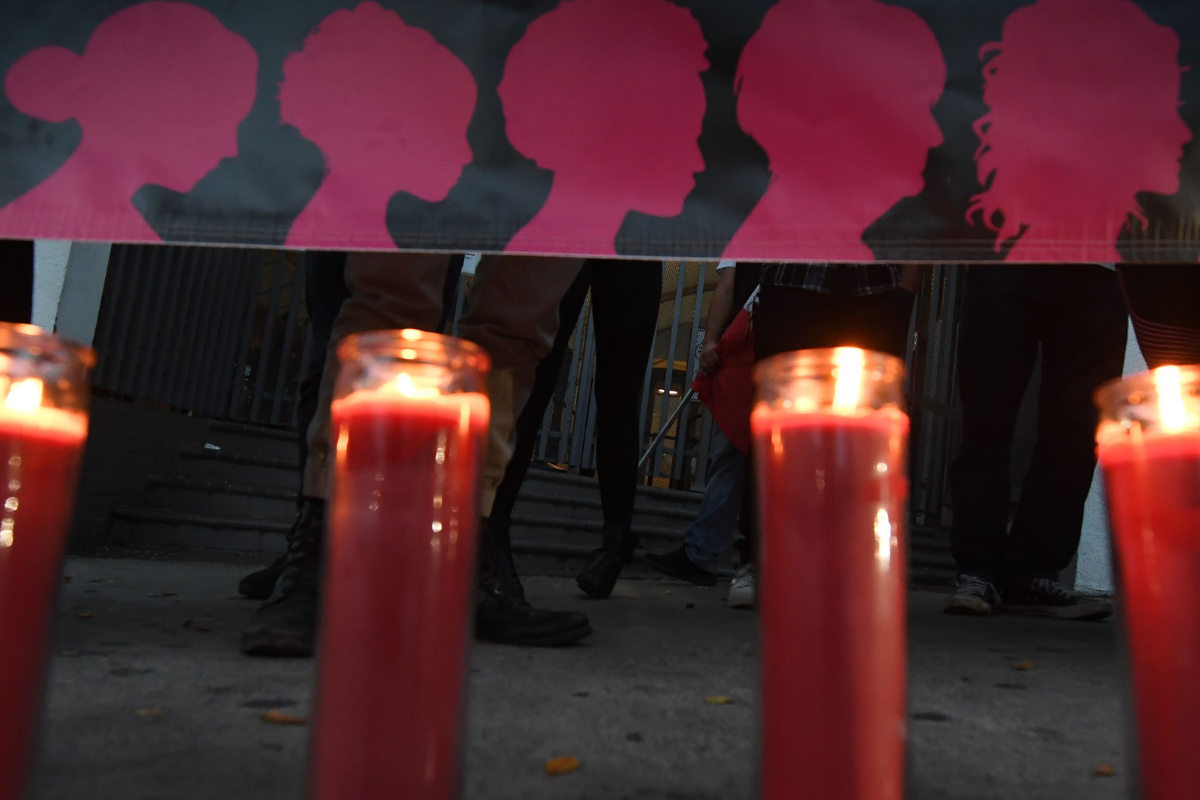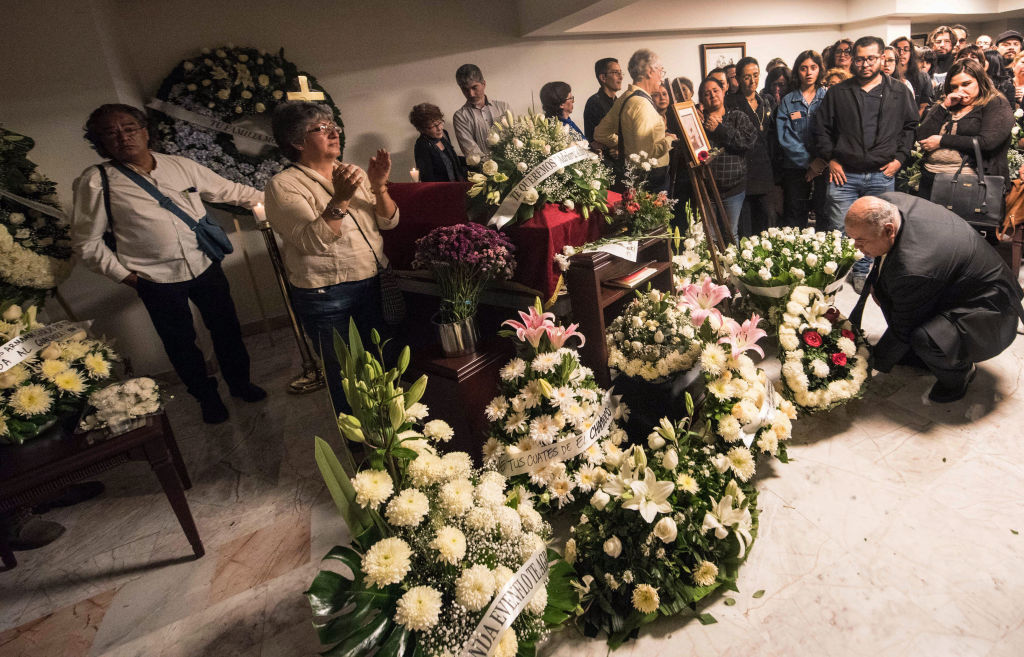

A group describing themselves as #MeToo/#YoTambién survivors hold a candlelight vigil outside the Mexico Consulate last year. (Photo by Mark Ralston/AFP/Getty Images).
It’s been over a week since the Mexican #MeToo movement erupted on social media, as hundreds of women studying or working in journalism, academia, film, politics, law, and other creative industries turned to social networks to share their stories of sexual harassment and abuse.
The outpour in social media caught many offguard, throwing institutions into paralysis or leaving them scrambling to respond to the outcry. Some opted to remove the accused men from their jobs, others opened spaces to scrutinize and self-reflect on the hegemonic cultural causes spurring the movement, suggesting safety protocols and sensibilization workshops.
In this way, the Mexican #MeToo movement has set itself apart from U.S. movement. In the U.S., #MeToo was created by activist Tarana Burke to bring attention to sexual assault in communities. It then became an online hashtag in October of 2017. However, the watershed moment was when sexual abuse allegations against Hollywood mogul Harvey Weinstein became public. In Mexico, the movement has focused everyday women who work in the aforementioned industries.
Eliud C. Delgado #metooescritoresmexicanos pic.twitter.com/DFzUNTaX1t
— MeTooEscritoresMexicanos (@MeTooEscritores) March 24, 2019
The avalanche was set off by a March 21 tweet from activist Ana G. González, when she accused a male writer of abusing and hitting more than 10 women.
Este hombre, a quien 54 de ustedes siguen, tiene una lista inmensa de mujeres que han salido a denunciar que las golpeó. Por lo menos una de ellas es una persona de mi círculo cercano. Si no sabían, se vale. Pero ahora que saben, no se junten con golpeadores. pic.twitter.com/mQM90mCzoO
— Ana G. González ? (@anag_g) March 21, 2019
The message spread, and soon the hashtag #MeTooEscritores (translating to #MeTooWriters) was echoed by groups from other guilds, who created accounts to denounce mistreatment in film, music, photography, the fine arts, activism, the business sector, and others.
The movement has shed light on how pervasive machismo and structural violence against women is, with recent surveys estimating over 70 percent of women working in media have suffered sexual harassment. In just a few days, the #MeToo Twitter handle from academia compiled lists with more than 300 men accused of abuse or harassment in higher education spheres.
2/8 Número de personas acusadas (no es el total de denuncias pues algunos sujetos repiten): 349
Denunciados de universidades en general: 184
Denunciados que operan en nivel medio superior: 36
Denunciados únicamente de la UNAM: 129
— MeTooAcadémicosMx (@MeTooAcademicos) March 31, 2019
“It has also turned into a catharsis and a collective hug,” reporter Itxaro Arteta told Latino Rebels.
Arteta decided to come out and publicly share her story of cyberharassment at the hands of her ex-boyfriend. In 2012, when she was a reporter working for the national outlet Reforma, her former partner started sending emails to the newsroom that everyone had access to, with the words “slut” or “your collection of men” in the subject line and compromising photos of Arteta in the body of the mail. The harassment went on for years and followed Arteta wherever she went, even when she left the country to pursue a master’s degree in Spain. Now, she said, she feels the reactions of her friends, family and community, and the newsroom where she is currently working, have been very supportive and sensitive to her story.
“I was sexually abused and I have always felt that fear, that shame of telling it. But seeing that there are so many of us makes me feel more secure. This has been very positive to me,” she said.
Es muy duro revivir todo esto, pero sólo quiero que tengamos más conciencia de lo que pasa a nuestro alrededor, de la gravedad de cosas que dejamos de pasar. Y sobre todo, que tengamos más empatía.https://t.co/sDiaJhoAPd
— Itxaro Arteta M (@iartetam) March 28, 2019
Arteta decided to share her story publicly, which puts her in a minority, since most of the allegations made through the Twitter #MeToo accounts have been anonymous at users’ request. Fear of violent retaliation is the predominant reason women wish to remain unnamed.
Arteta said she could come up with a couple of examples of women with strong cases to make anonymous accusations. One of them denounced a writer who sent her very well-written texts detailing how he was going to torture her and hurt her daughter.
“I get that fear,” she said, “and I don’t have kids, you know?”
One of the things that has become clear is that Mexico still has a long way to go before it can guarantee safe and effective responses to sexual harassment in the workplace and other spheres, one of the members from Periodistas Unidas Mexicanas or @PeriodistasPUM told Latino Rebels (the members of the collective keep their identity anonymous for fear of backlash or punitive retaliation in the workplace). But they also said that the movement shouldn’t center around the issue of gender violence.
“This goes beyond that,” said the member of the collective. “People go and ask the feminists what they think. But this is also a workplace issue, we should also be asking ourselves why the human resource departments don’t follow due processes in the instances women do file a claim.”
For some, the movement turned sour on April 1, when the founder of the Mexican rock band Botellita de Jerez, Armando Vega Gil, committed suicide, claiming in a suicide letter he was falsely accused of sexually abusing a minor. Pundits lamented that the #MeToo hashtag had turned into a media lynching and public witch hunt.


Relatives and friends of Armando Vega Gil, 63, attend his funeral in Mexico City on April 1, 2019. (Photo by Alejandro Melendez/AFP/Getty Images)
For human rights journalist Blanche Petrich, the death of Vega Gil should have cued everyone to fall silent for a moment, a respite from the accusations and victim-blaming.
“But #MeToo was not able to recognize the value in silence,” she wrote in La Jornada (translated from Spanish). “Over the grief and tears of the family and friends of Botellito de Jerez, the blind judges spoke: ‘to play with that in order to escape a lawsuit for pederasty and try to clean your image is not only cowardly, it is vile.’ For me, the Mexican #MeToo sank with those words.”
Anthropologist and feminist Marta Lamas also frowned down on how the outcry had evolved and particularly on the anonymous accusations. She did so during a radio interview which you can listen to here:
@PeriodistasPUM’s response was that they don’t advocate for a public lynching but that they found that with gender violence —and many other violences— the absence of government or institutional response left few other alternatives for change.
“The bottom line is that this is a call to action for men to revisit their levels of violence. This is not an individual issue, but rather a collective, social one, and we believe it’s the right moment to shake off and deconstruct the ways in which we have been educated. And to respect. It’s as simple as that,” said the journalist from PUM.
With the movement growing and constantly evolving, the PUM collective said all the Mexican #MeToo accounts weren’t really networked or working together (“this whole situation has overwhelmed us”) and not all of the social media accounts sharing the stories have been as transparent or systematic as to how they are processing the incoming anonymous accusations of sexual abuse.
For now, the next step will be to expand the network and include lawyers and other associations. Armed with systematized and organized testimonies, PUM will demand that the government or the companies involved take action.
***
Emily Corona is a digital intern at Futuro Media. She is a journalist and translator from Mexico City, pursuing a master’s in journalism and Latin American and Caribbean studies at NYU. She tweets from @daminijo.



[…] protests are taking place just months after Mexico’s #MeToo movement (using several hashtags such as #metooescritoresmexicanos and […]
[…] protests are taking place just months after Mexico’s #MeToo movement (using several hashtags such as #metooescritoresmexicanos and […]